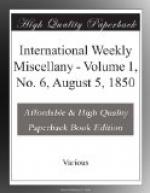“Our third lady, Mrs. Gaskell, belongs also to the country, and is the wife of a Unitarian clergyman. In this capacity she has probably had occasion to know a great deal of the poorer classes, to her honor be it said. Her book, ‘Mary Barton,’ conducts us into the factory workman’s narrow dwelling, and depicts his joys and sorrows, his aims and efforts, his wants and his misery, with a power of truth that irresistibly lays hold upon the heart. The scene of the story alternates from there to the city mansion of the factory owner, where, along with luxury and splendor we find little love and little happiness, and where sympathy with the condition of the workman is wanting only because it is not known, and because no one understands why or how the workman suffers. The book, is at once very beautiful, very instructive, and written, in a spirit of conciliation.”
* * * * *
Margaret Fuller, marchesa D’OSSOLI.
Sarah Margaret Fuller, by marriage Marchioness of Ossoli, was born in Cambridge, Massachusetts, about the year 1807. Her father, Mr. Timothy Fuller, was a lawyer, and from 1817 to 1825 he represented the Middlesex district in Congress. At the close of his last term as a legislator he purchased a farm near Cambridge, and determined to abandon his profession for the more congenial one of agriculture; but he died soon after, leaving a widow and six children, of whom Margaret was the eldest.
At a very early age she exhibited unusual abilities, and was particularly distinguished for an extraordinary facility in acquiring languages. Her father, proud of the displays of her intelligence, prematurely stimulated it to a degree that was ultimately injurious to her physical constitution. At eight years of age he was accustomed to require of her the composition of a number of Latin verses every day, while her studies in philosophy, history, general science and current literature were pressed to the limit of her capacities. When he first went to Washington he was accustomed to speak of her as one “better skilled in Greek and Latin than half of the professors;” and alluding in one of her essays, to her attachment to foreign literature, she herself observes that in childhood she had well-nigh forgotten her English while constantly reading in other tongues.




